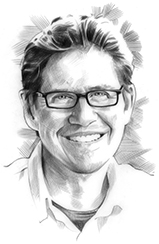My Northwestern Direction: Kris Hammond
Tell us what you think. E-mail comments or questions to the editors at letters@northwestern.edu.
Find Us on Social Media
by Kris Hammond, professor of electrical engineering and computer science, McCormick School of Engineering, Northwestern University
My entire career has been focused on the idea of partnership and impact.
 My core training is in artificial intelligence: the modeling of uniquely human capabilities on computers. This means that I spend my time thinking about how to implement human intelligence, problem solving, language use and creativity on machines. Which is to say, I think about how to make machines more like people.
My core training is in artificial intelligence: the modeling of uniquely human capabilities on computers. This means that I spend my time thinking about how to implement human intelligence, problem solving, language use and creativity on machines. Which is to say, I think about how to make machines more like people.
Of course, the endgame of this kind of work is the development of machine intelligence that is as good, or even better than, human intelligence. I want to build machines that are smarter than we are.
But my goal is not to replace or even augment human efforts. My goal is to create intelligent partners that can be integrated into our lives and work, partners that fill in the gaps in those places where we may have deficits, while we fill in the gaps where they may have issues. I view the machine not so much as a tool but as a partner- or colleague-in-training; not just a colleague for me but for the broader community of thinkers and doers.
When I came to Northwestern in 1999, this was at the forefront of my thinking and was one of the primary reasons for my move from the University of Chicago.
Unquestionably, Northwestern is an environment in which the power of open-minded partnership and links between fields are promoted at all levels of the University. As a department, electrical engineering and computer science has links to education, medicine, business, journalism and other departments within engineering. The McCormick School of Engineering is guided by a vision of purpose-driven research and the intersection between the ideas that flow from our work and the fields in which that work will be applied.
On a personal level, it means that I have been encouraged to follow my own vision and seek out opportunities for intersection and impact in those areas that are well outside of core computer science. At some institutions such work might be seen as too applied. At Northwestern and within McCormick it is seen as a crucial component of the mission. There are many ways to move ideas forward. At Northwestern one of the primary ways is to make them real.
For me in particular, this notion of partnership is not simply a slogan or theoretical idea. My partnership with the Medill School of Journalism, Media, Integrated Marketing Communications resulted in a technology that is at the core of a company I co-founded called Narrative Science that is transforming the way people interact with data. The company’s platform, Quill, is an artificial intelligence system that extracts meaning from data and then transforms it into language that anyone can understand. It democratizes information and frees people from the need to become data scientists. Even more important, the company (now 90 strong) and the technology (used by more than 70 enterprise customers) would not have come into being without the partnership between McCormick and Medill that gave rise to the first prototype. As a result, literally millions of product descriptions, investment reports, employee performance reviews and even news stories are now generated by Quill for Narrative Science customers.
The computer science division, McCormick and the University are now at the beginning of a new phase of this notion of partnership, intersection and impact. Part of the University’s recent initiative to expand computer science is the idea of growth in those areas where the machine and computational thinking are having transformational impact on other fields.
This vision is a powerful view of the future of computer science. The fields of education, medicine, journalism, entertainment and commerce have all been fundamentally transformed by computation. It is clear that the impact of computers on our work and lives is accelerating and shows no signs of slowing.
I have never been more excited about my field, my work or the future of Northwestern than I am today. And it is all based on the simple notion that at the core of transformation, at the core of impact, is partnership.



 Facebook
Facebook Twitter
Twitter Email
Email


